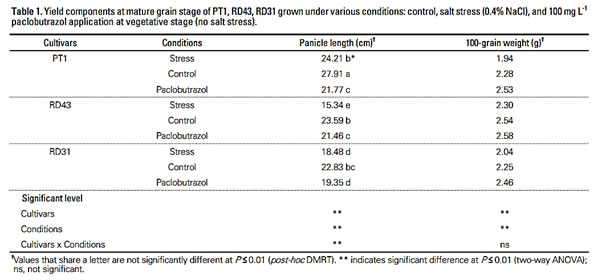
Sunipa Detpitthayanan1, Kanokwan Romyanon2, Wisuwat Songnuan1, Metha Metam3, Aussanee Pichakum1*
1 Department of Plant Sciences, Faculty of Science, Mahidol University, Bangkok 10400, Thailand
2 National Center for Genetic Engineering and Biotechnology (BIOTEC), National Science and Technology Development Agency (NSTDA), Pathum Thani 12120, Thailand
3 Department of Biology, Faculty of Science, Mahidol University, Bangkok 10400, Thailand
Fragrant rice is preferred by the domestic consumers and is an important export commodity of Thailand. Approximately one half of the rice produced and one-fourth of the exported Thai rice is fragrant rice (FAO 2017). Even though commanding a higher price, 1.5 - 2 times the value of non-fragrant white rice, the fragrant rice varieties are often associated with low grain yield (Giraud 2013). Therefore, strategies to improve the productivity of the fragrant rice in the saline, arid soil and/or to boost the aromatic quality of the fragrant rice varieties cultivated in the fertile lands are urgently needed.
Paclobutrazol (PBZ) application usually results in plant height and root length reduction by decreasing cell wall expansion along with increasing cell wall stiffness (Behringer et al. 1990; Potter and Fry 1993; Yang et al. 1996). Effects of PBZ on the reduction of vegetative growth had been reported in apricot tree (Arzani and Roosta 2004) and potato (Tekalign and Hammes 2005). In chrysanthemum, PBZ caused a decrease in stem diameter and pith cell length, leading to increased secondary xylem development, but adversely altered root cortical cell length leading to inhibited secondary vascular development (Burrows et al. 1992). As the vegetative growth is retarded by PBZ, nutrients become accumulated inside the plants. Thus, PBZ application can be beneficial to the plant productivity.
KDML105 rice (Oryza sativa L.) cultivar, also known as the jasmine rice, is the most valuable fragrant rice of Thailand. The aroma is attributed to a highly 2-acetyl-1-pyrroline (2AP) compound, which is abundantly produced when rice plants are cultivated in the infertile saline soil in northeastern Thailand. The area suitable for production of KDML105 has been limited, and the farmers suffer low grain yield as a trade-off for the premium quality.
In this study, we investigated whether foliar application of paclobutrazol (PBZ), which is a plant growth retardant, could mimic the effect of salt stress in promoting the 2AP content of the Thai fragrant rice.
PBZ had a possibility to enhance productivity, aroma, and amylose content of rice grains when applied at a suitable rate and growth stage. For the KDML105 cultivar, PBZ application was shown to increase the 2AP grain content to a level that is comparable to the amount produced under salt-stress condition. Moreover, PBZ also improved percent filled grains without significant yield loss. The potential use of PBZ therefore provides an opportunity for obtaining high-quality KDML105 grains at a greater yield when cultivated in areas with low salinity. For RD31, the amylose content could be improved with PBZ application. These beneficial effects of PBZ should be further validated in field trials. The variable responses to PBZ application among cultivars warrants further studies to determine suitable dosage, timing, and other factors concerning the methods of PBZ application, and further studies to understand the basis of genetic interactions.
Financial Support
1. Institutional Strengthening Program, Mahidol University, Thailand
2. National Research Council of Thailand
https://link.springer.com/article/10.1007/s12892-019-0109-0




